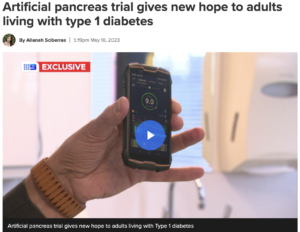I’ve mentioned previously a clinical trial I was involved in running, in which 20 people used AndroidAPS and research YpsoPumps.
The next trial is now up and running. It’s called “CLOSE IT” (or sometimes CloseIt or Close-It) which stands for “Closed Loop Open SourcE In Type 1 diabetes”. No in case you’re wondering, I didn’t come up with the name.
The top-level description is:
Randomised controlled trial investigating the safety and efficacy of an open source automated insulin delivery system without manual mealtime boluses, in people with type 1 diabetes.
Overview
 Basically, it’s using Lotus (which is research-oriented software that’s descended from AndroidAPS) with Dexcom G6 CGM and the latest version of the research YpsoPumps. The Automated Insulin Delivery (AID) algorithm being tested is oref1, the same as used in AndroidAPS, OpenAPS, etc.
Basically, it’s using Lotus (which is research-oriented software that’s descended from AndroidAPS) with Dexcom G6 CGM and the latest version of the research YpsoPumps. The Automated Insulin Delivery (AID) algorithm being tested is oref1, the same as used in AndroidAPS, OpenAPS, etc.
This time there will be 75 participants (spread between a site in Australia and one in New Zealand). Each person will be using the system for at least 6 months.
In the first 3 months they use it in “hybrid closed loop” mode, where they announce all food, bolus for meals, etc. Similar to most commercial AID systems really.
But in the second 3 months they’re randomised so that half of the people will keep operating the same way, and half of them will move to not announcing food or giving manual boluses.
There’s a 1-month smaller extension trial which will be comparing the results of using different insulins (NovoRapid vs Fiasp).
This is an RCT investigating the behaviour of the “fully closed loop” system and lifestyle I have been using for some years now. Instead of just individuals like me documenting our experiences, it’s intended to provide robust data which will stand up to academic scrutiny. The recruitment is quite varied: some participants will have never used an insulin pump before, some will be seasoned pumpers, some will have used commercial AID systems. Similarly there will be varied CGM experience levels. Unfortunately for some of my audience, people who have been using OS-AID systems (e.g. Loop and AndroidAPS) are excluded due to the design of the trial protocol.
It won’t surprise you to learn that one of my roles is as part of the team providing the technical infrastructure for the system. I’m using Lotus every moment of every day myself, although I personally am using an experimental branch distinct from the stable version that was set for the trial.
Timeframes
Of course those 75 people are not all running together but will be staggered in time, so the last of the cohort won’t be finished before 2024. Unfortunately clinical trials take time when you dot all the i’s and cross all the t’s.
Last month a local TV station ran a story on the trial.
 As expected, some of the technical details did get lost in translation, but it’s not a terrible story. I did find it amusing to see the sample name they used on their made-up graphs.
As expected, some of the technical details did get lost in translation, but it’s not a terrible story. I did find it amusing to see the sample name they used on their made-up graphs.
Equipment
The YpsoPumps used in the trial are a later version than the “OPN” version used in the previous trial. They’re similar to the public “Dose” (1.5X) YpsoPumps used with CamAPS, except that the public pumps use an extra encryption layer that we cannot currently access. So while we’re able to show what these pumps can do, we can’t yet use our software with the public pumps.
The Android devices being used are Cubot KingKong Mini 2 Pros that are locked down and administered using Google infrastructure.
Lotus itself is not currently available outside clinical trials, although much of its code will be accessible in the coming months. We’re working on that! In the meantime, similar functionality is used by thousands of AndroidAPS users around the world every day.

I’ve never pumped before, 3yrs T1D; but if I did, this is the system I would want. I really hope this becomes a reality available for all of us, especially the youngest members of this unpopular club.
I often also worry about old age and how my T1D will be managed if I can’t do it myself, and this looks like a solution that aged care facilities could be trained use.
As David says, much of this functionality is already available in AndroidAPS and there are different flavours that use different algorithms for iOS.
I started using AAPS, after first reading about it on this blog, about a year ago and it has been life-changing. For the first time in 32 years with diabetes, I have felt like I am in charge (with a lot of help from AAPS) and that is hugely motivating when it comes to being more proactive in maintaining good control.
I imagine too late now but how/ where can you express interest about getting involved in these trials ?
You’re right I believe there’s quite a waitlist by now, but the trials at the Baker Institute in Melbourne can be found on their website.
Me, waiting for Ypsomed to free their Ypsopump – “Zzzzzzzz……”
😉
Does anyone know if ypsomed will allow AAPS in the future? I (strongly) want to keep using AAPS but DANA appears to be dropping support in Australia so need to find a new pump that is (or will be) able to talk with an open source AID. At this stage its looking like ill need to go back to manual injections:( I really dont want to give up privacy by using a proprietary system, and I also really benefit from the added functionality that various forks of AAPS provide. Oh and most (all?) of the closed source pumping rubbish wont run on my phone anyway!
No AAPS on the YpsoPump seems unlikely at this point. I am hopeful that another system might be able to access it at some point, but the way they set up the key management makes it very unlikely a fully opensource system will be able to integrate.